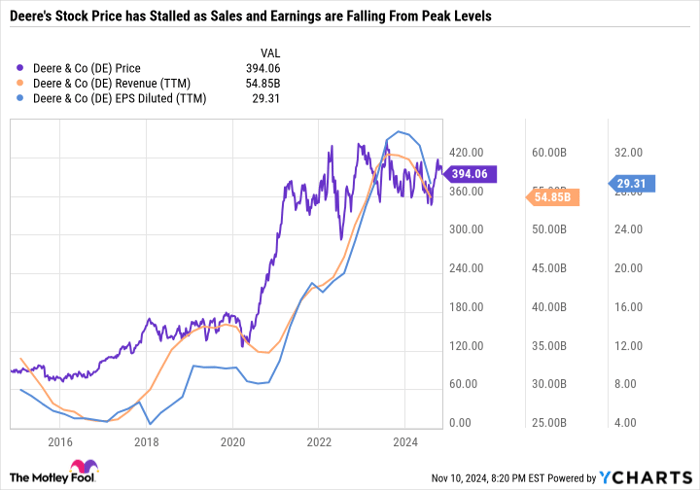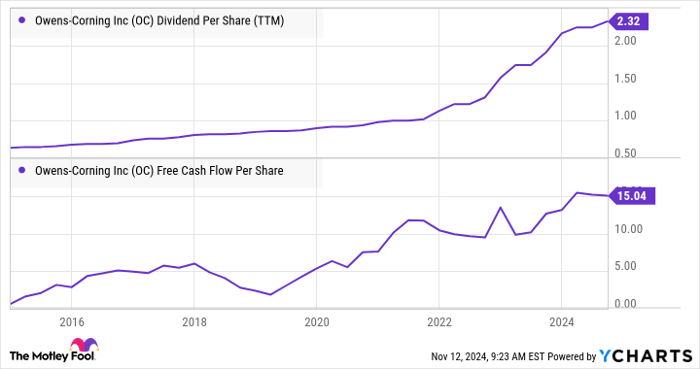There are a couple of different ways to approach investing in the stock market when it's near an all-time high. Some investors may choose to ride the momentum higher or simply put their money to work in market-leading growth stocks. Others may prefer to go searching for value stocks or dividend stocks that are trading at less expensive valuations.
If you're in that latter camp, consider Essential Utilities (NYSE: WTRG), Deere (NYSE: DE), and Owens Corning (NYSE: OC). They make up for their lack of glitz and glam with growing payouts and compelling valuations. Here's what makes these dividend stocks worth buying and holding for years to come.

Image source: Getty Images.
Quench your thirst for an inexpensive high-yield dividend stock with Essential Utilities
Scott Levine (Essential Utilities): With the S&P 500 up by more than 20% year to date, finding quality stocks that aren't overpriced can be a challenging endeavor. But identifying compelling dividend stocks that are actually trading on the cheap? That can be even more difficult. Fortunately, investors don't have to look much further than water utility Essential Utilities. While the S&P 500 has ripped higher since the start of the year, Essential Utilities has only crept up 3%. The shares are sitting in the bargain bin, presenting a great opportunity for income investors to scoop them up at a price that gives their dividend a yield of 3.4%.
Essential Utilities lacks the razzle-dazzle of technological innovators in areas like artificial intelligence. But for income investors, boring companies can be pretty exciting. The allure of Essential Utilities is that it generates steady, predictable cash flows from its water and wastewater services: About 98% of earnings come from its regulated businesses. This has helped the company to maintain a 33-year streak of annual dividend raises. And those hikes haven't been nominal, either. From 2015 to 2024, Essential Utilities has boosted its dividend at a 7% compound annual growth rate.
With shares changing hands at 13 times operating cash flow, Essential Utilities is a bargain, particularly considering that its five-year average cash flow multiple is 16.9. Prefer to asses stocks using the price-to-earnings (P/E) ratio? The stock's attractively priced by that metric, too, trading at a multiple of 19.2, a discount to its five-year average P/E ratio of 27.4.
Deere is an industry leader at a compelling value
Daniel Foelber (Deere): The industrial sector has had a rip-roaring 2024 so far, with sector-focused exchange-traded funds like the Vanguard Industrial ETF hovering around their all-time highs. But not every industrial stock has joined in on the rally.
Deere is down slightly year to date, and the stock price has gone practically nowhere for the last three years despite the company producing strong earnings.
Deere's stock price surged in late 2020 and 2021 as the COVID-19 pandemic and Russia's invasion of Ukraine disrupted global supply chains and led to surging crop prices and a boom in capital spending by many of Deere's customers. Its sales and earnings have fallen slightly from their peaks, but are still up considerably from their pre-pandemic levels.
Deere's strong earnings and its languishing stock price have pushed its P/E ratio down to just 13.4. However, when it comes to companies in cyclical businesses, it's a bad idea to focus too much on P/E, because their valuations will largely look expensive during downturns and cheap during periods of expansion. But Deere stock is so cheap now that if earnings were cut in half from here, it would still trade at a discount to the S&P 500's average P/E ratio of 30.7.
Deere has an industry-leading product portfolio spanning the agriculture, forestry, and construction industries, among others. So, there's no denying its long-term potential. The simplest reason the stock has been under pressure this year is the company's inability to forecast its near-term results accurately. On Nov. 22, 2023, Deere reported its full fiscal 2023 results and forecast $7.75 billion to $8.25 billion in net income for fiscal 2024. The forecast was noticeably weaker than the $10.17 billion Deere earned in fiscal 2023, but it was still impressive given that it had worked through so much pent-up demand in the prior few years.
Fast forward to Aug. 15, and Deere was guiding for just $7 billion in fiscal 2024 earnings. We'll find out how closely reality matched that forecast when Deere reports its results on Thursday. But right now, investors may be taking a wait-and-see approach to Deere in case management guides for a further slowdown in fiscal 2025.
At the current share price, Deere's dividend yields just 1.5%, but it could easily swing a much higher payout if it didn't repurchase so much stock. Deere's capital return program uses both dividends and buybacks to reward shareholders. Over the last decade, Deere has increased its dividend by 145% and reduced its share count by 20.5%. Deere's payout ratio is just 19%, meaning that if it returned all of its earnings to shareholders through dividends, its yield would be over 7.5%. Put another way, Deere's earnings could fall by two-thirds and it would still have a healthy payout ratio within the desired 50% to 75% range.
Add it all up, and Deere stands out as a great value stock to buy now.
Owens Corning management doubles down on its core end market
Lee Samaha (Owens Corning): Investing history is littered with hard-luck stories and missed opportunities, usually when end-market weakness created buying opportunities that investors or management teams didn't take advantage of. If a company is going through temporary weakness, but management believes in its long-term growth prospects -- and you do too -- the correct move is to take advantage and double down on it while other investors are fearful.
Building products company Owens Corning offers just such a narrative. The company began this year as a roofing products, insulation, and composites company with heavy exposure to the North American residential construction market, but its opportunistic acquisition of doors company Masonite in May expanded its footprint. In essence, it took an opportunity to double down on the housing market. Its customers can now source roofing materials, insulation, and doors from a single company. And if Owens Corning achieves the $125 million in synergies it expects from the deal, it will have paid just 6.8 times earnings before interest, taxation, depreciation, and amortization (EBITDA) for Masonite.
It's also a potential dividend grower. Although its current yield is only 1.2%, management has hiked the payout significantly in recent years, and given how well its free cash flow covers its dividend, it has plenty of room for further increases.
OC Dividend Per Share (TTM) data by YCharts.
The macro outlook and the Federal Reserve's plans still point to a lower interest rate environment on the horizon. That should be good for the housing market -- and if housing picks up, Owens Corning's Masonite deal may well turn out to have been a masterstroke. With the stock trading at less than 13 times its estimated 2024 earnings, buying in now could prove a similarly smart move for investors.
Don’t miss this second chance at a potentially lucrative opportunity
Ever feel like you missed the boat in buying the most successful stocks? Then you’ll want to hear this.
On rare occasions, our expert team of analysts issues a “Double Down” stock recommendation for companies that they think are about to pop. If you’re worried you’ve already missed your chance to invest, now is the best time to buy before it’s too late. And the numbers speak for themselves:
- Nvidia: if you invested $1,000 when we doubled down in 2009, you’d have $378,269!*
- Apple: if you invested $1,000 when we doubled down in 2008, you’d have $43,369!*
- Netflix: if you invested $1,000 when we doubled down in 2004, you’d have $476,653!*
Right now, we’re issuing “Double Down” alerts for three incredible companies, and there may not be another chance like this anytime soon.
*Stock Advisor returns as of November 18, 2024
Daniel Foelber has no position in any of the stocks mentioned. Lee Samaha has no position in any of the stocks mentioned. Scott Levine has no position in any of the stocks mentioned. The Motley Fool has positions in and recommends Deere & Company. The Motley Fool recommends Owens Corning. The Motley Fool has a disclosure policy.
The views and opinions expressed herein are the views and opinions of the author and do not necessarily reflect those of Nasdaq, Inc.




